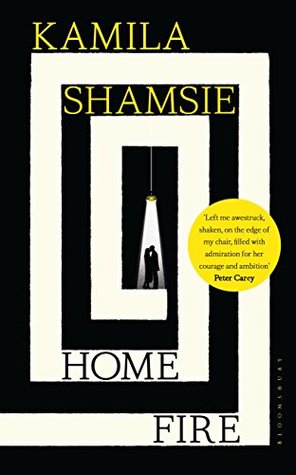Two Muslim families collide in Kamila Shamsie’s Home Fire; one from a wealthy, privileged, political family, the other from Wembley’s poor immigrant community. Eammon, son of British Pakistani Home Secretary, Karamat Lone and his glamorous American designer wife, Terry, falls head over heals in love with Aneeka, orphaned Pakistani girl with Jihadi father and brother. Interesting premise for a story and fertile ground for moral dilemmas and culture clashes. Shamsie keeps the suspense and gripping love story moving at an impressive pace. Shame, then, that the ending feels contrived. I blame it on Sophocles.
Aneeka, her twin brother Parvaiz and 9-year older sister Isma, have been raised by their mother, and, following her death, a family friend. Their enigmatic father Abu Parvaiz, an infamous fighter and jihadist whose list of battlefields include Chechnya, Kashmir, Bosnia and Afghanistan, died years ago while on a plane headed for Guantanamo Bay. After their mother dies, Isma, Aneeka and Parvaiz are left to fend for themselves, not easy with a jihadist family association dangling over their heads.
As the twins come of age, the sensible, responsible Isma moves to the U.S. to finish her studies while Parvaiz disappears into IS occupied territory, leaving behind a determined but volatile Aneeka who will do anything to save her brother. Enter Eammon, the potential saviour, at least in the eyes of Aneeka.
Identity is at the core of Shamsie’s novel. For Eammon, whose father will stop at nothing to disassociate himself from his Muslim roots while climbing the greasy pole of politics; for Parvaiz, who’s easy fodder for hate preachers as he tries to figure out what his absent father was all about and for Aneeka who loves her brother but hates his cause. The book gives a thought-provoking insight into what it must be like to be a Muslim in Britain today, from identity to more practical realities such as going through passport control or being spat at on the tube. Or worse, being the innocent bystander to a Jihadist family member.
Home Fire is a contemporary reimagining of Sophocles’ Antigone which might not say much unless you’re very well read or have a perfect memory of your ancient Greek classics lessons at school. The challenge with reimaginings (which seems to be all the rage these days) is that it leaves the author in a creative straight jacket, having to follow a predetermined story. Sometimes it works (such as in the case of Nutshell, Ian McEwan’s reimagining of Hamlet), sometimes it doesn’t. Sadly, Home Fire falls into the latter category and mainly because of its contrived, melodramatic, James Bond-esque ending modelled on the story of Antigone. Too bad, as this could have been brilliant had Shamsie freed herself from the shackles of Sophocles.
Home Fire is published by Bloomsbury Circus, 272 pages.





